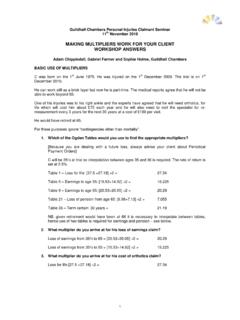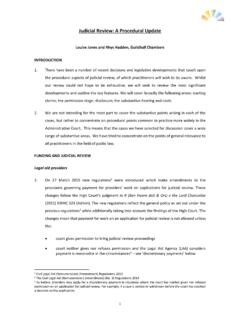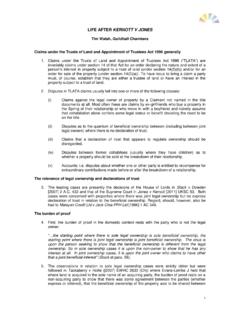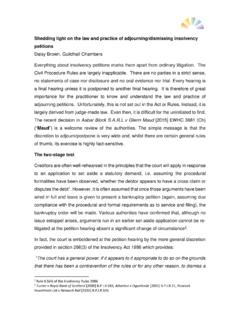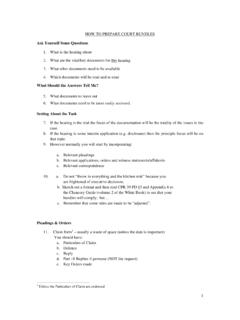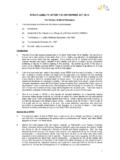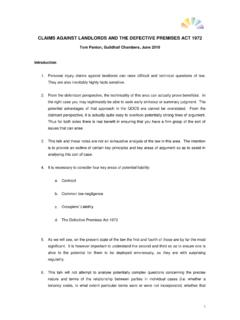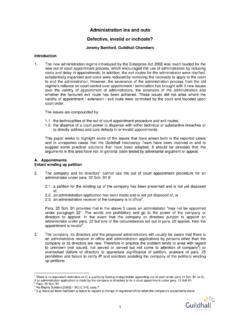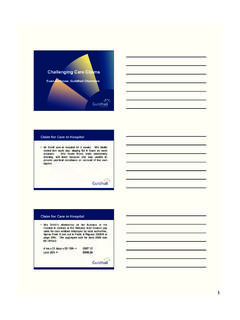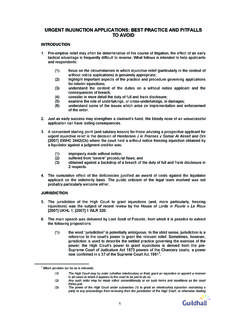Transcription of Applications under s 236 Insolvency Act 1986
1 1 Applications under s 236 Insolvency Act 1986 Neil Levy, Guildhall Chambers Introduction 1. The IA s 236 powers of investigation are intended to enable the court to help an office-holder to discover the truth of the circumstances in connection with the affairs of the company, its trading and dealings, in order that the office-holder may be able, as effectively as possible and with as little expense as possible to complete his function, being (in the case of a liquidator) to put the affairs of the company in order and carry out the liquidation in all its various aspects, including getting in any 2. The powers compel the provision of information to the office-holder, whether by the provision of books, papers or other records, by answering requests for clarification, providing an affidavit, or submitting to oral examination: IR r (3).
2 3. Material obtained may be used for other purposes eg reporting to the appropriate authorities of criminal offences or misconduct relevant to proceedings for the disqualification of a director. 4. The court will need to be satisfied that the powers are being invoked for proper purposes, and that it is just and convenient to make an appropriate Scope 5. The section 236 jurisdiction is expressed in the widest terms .3 It extends to company members voluntary liquidation and winding-up on a contributory s petition or in the public Equivalent powers exist for investigation of the affairs of bankrupts: s 336 IA. 6. Section 236 extends to documents which comprise not only the company s own records but those of third parties which relate to the affairs or property of the Applicant 7.
3 The applicant is the office-holder (provisional liquidator, liquidator, administrator, administrative receiver) or, in compulsory liquidation, the OR (whether or not he is liquidator)6: s 236(1). The power is not available to a nominee of a voluntary arrangement, or to a contributory or Respondent 8. The respondent can be any officer of the company, any person known or suspected to have in his possession property of the company or supposed to be indebted to the company, and any person the court thinks capable of giving information concerning the promotion, formation, business, dealings affairs or property of the company: s 236(2). For the comparable provisions in bankruptcy, see s 336(1). 9. Persons include corporations. An order against a corporation will require compliance by a proper officer.
4 10. Directors, debtors, shareholders, auditors, solicitors and bankers are often targets. The power is also exercisable against administrative receivers,8 and against the 1 Re British & Commonwealth Holdings plc [1993] AC 426 at 438 (HL). 2 Re British & Commonwealth Holdings plc at 439-440. 3 Re Pantmaenog Timber Co Ltd [2004] 1 AC 158 (HL) at 163. 4 Re Galileo Group Ltd [1998] 1 BCLC 318 at 332. 5 Re Trading Partners Ltd [2002] 1 BCLC 655 at para 11. 6 The OR successfully applied at a time when he was not liquidator in In re Pantmaenog Timber Co Ltd [2004] 1 AC 158. 7 Re James McHale Automobiles Ltd [1997] BCC 202. 8 Re Trading Partners Ltd [2002] 1 BCLC 655 at para 14; Re Delberry Ltd [2008] BCC 653. 9 Soden v Burns [1996] 2 BCLC 636. 2 11.
5 The power probably extends to respondents out of the jurisdiction,10 although there is some doubt whether ss 236 and 336 can be used to order someone outside the jurisdiction to be examined in the jurisdiction. The application 12. The application is usually made by ordinary application in existing Insolvency proceedings (including where an administrator has been appointed out of court) to a registrar or District Judge in the first instance. Where there are no such proceedings (such as in a voluntary winding-up or administrative receivership), the application is made by originating application. 13. The application must sufficiently identify the respondent. IR r (2). 14. The application should specify the order sought, and in particular whether it is for an oral examination, clarification/additional information, an affidavit (with details of the matters the affidavit is to cover) or for production of books, papers or other records (in which case they must be specified).
6 Merely requesting an account of all dealings by the respondent with the insolvent company/bankrupt is not sufficient. The request must be more specific as to the information It may adversely affect the court s view as to the office-holder s need for the information if the application is not sufficiently specific or is framed in indiscriminate 15. The application may be accompanied by Applications (where proper grounds exist) for ancillary orders in the form of interim injunctions, such as a No say injunction (restraining the respondent from disclosing the order to third parties), an order restraining the respondent from leaving the jurisdiction pending examination, or a search and seizure Evidence 16. The application must be accompanied by a brief statement of the grounds on which it is made: IR r (1).
7 The statement should make full disclosure of the relevant circumstances known to the office-holder. It will usually need to cover (a) the identity of the respondent and the respondent s relationship with the insolvent (b) the information which the applicant requires from the respondent (c) reasons why the court s assistance is required and (c) an explanation of the relief sought. 17. If there is any information which the office-holder wishes to keep confidential from the proposed examinee, he should identify it and put it in a separate confidential annex which is not served on the respondent. The statement should explain why the office-holder wishes to keep the annex 18. Good reasons for keeping documents confidential include the fact that disclosure would defeat the reason for seeking an examination instead of seeking answers on affidavit,15 or if the documents contain highly sensitive But the court must also be satisfied that the application can be fairly and properly disposed of without the respondent seeing the documents in question.
8 Notice 19. There must be good and sufficient reason for an application to be made without notice such as where documents are urgently required or that the material might be lost or destroyed if the 10 Re Casterbridge Properties Ltd [2002] BCC 453; McIsaac [1994] BCC 410 (Scots Court of Session; Outer House); and Re Seagull Manufacturing Co Ltd [1992] Ch 128 at 137 (Mummery J); and on appeal ([1993] Ch 345 at 358) where the issue concerned public examination under s 133 IA, but the court held that power could be invoked against persons who were out of the jurisdiction even if they were not British subjects. In Re Mid East Trading Ltd [1998] BCC 726 it was held that an order could be made in relation to documents held abroad relating to a company being wound-up in the jurisdiction.
9 11 Re Aveling Barford Ltd [1989] BCLC 122 at 127. 12 See for example Colishaw v O&D Building Contractors [2009] EWHC 2445 (Ch) at para 42. 13 See for example Daltel Europe Ltd v Makki [2005] 1 BCLC 594, where freezing orders and orders for delivery up of passports were made. 14 Re British & Commonwealth Holdings plc (No 2) [1992] Ch 342 at 356. 15 As in Re Bishopsgate Investment Management Ltd (No 2) [1994] BCC 732. 16 As in Re Murjani [1996] 1 BCLC 272. 3 respondent is made aware of the application in Urgency attributable to the office-holder s own delay, a wish to avoid disclosing confidential material, or dealing with an unco-operative respondent are not good 20. As with any without notice application, the evidence in support must be such as to meet the need for full and frank This means setting out material facts bearing on the decision whether or not to grant the order.
10 21. An order wrongly obtained without notice will not necessarily be discharged unless the respondent can show some substantive matter in issue and Likewise the court has a discretion whether to discharge an order obtained without notice in circumstances where there was a failure to make full and frank Demonstrating a proper case 22. For the court to exercise its discretion in favour of making an order, the applicant must satisfy the court that, after balancing all relevant factors, there is a proper case for the order to be made. A proper case is one where the office-holder reasonably requires the information/documents to carry out his functions and the production does not impose an unnecessary and unreasonable burden on the respondent.
